Technology
How Career & Technical Education Changed My Life
By Guest Blogger on February 21st, 2017
 In honor of Career and Technical Education (CTE) Month, I would like to reflect on the influence CTE has had on my life – even though I didn’t realize it until a decade later.
In honor of Career and Technical Education (CTE) Month, I would like to reflect on the influence CTE has had on my life – even though I didn’t realize it until a decade later.
As a teenager, I wasn’t a big fan of school. Classes, homework, and way too much science! I couldn’t stand it.
However, every time I left my rural campus to assist nurses at the local hospital, I felt the thrill of escape and the fun of doing something new. So, for all the wrong reasons, I enrolled in my high school’s nursing program and was quickly on my way to plenty of time not in school. The perfect plan!
It didn’t take long for me to learn my first CTE lesson: there is much more to a nursing program than wearing scrubs and getting out of class. I’d signed up for a daily, three-hour block of anatomy and physiology, as well as an introduction to nursing skills. Yep, my brilliant plan to escape school somehow locked me into three hours of science a day. Continue reading
12 Months of Life Skills for Student Success
By Guest Blogger on January 13th, 2017
 As we start a new year, educators and parents all have a common goal for 2017 – to ensure that our children have the skills and knowledge they need to be successful for college and a future career.
As we start a new year, educators and parents all have a common goal for 2017 – to ensure that our children have the skills and knowledge they need to be successful for college and a future career.
What if we each set a goal to teach our students one skill a month?
If all of our students put this plan into action today, can you imagine the impact we could make on our future generation?
Today’s workplace values creativity, collaboration, critical thinking, and communication skills. Managing time, setting goals, handling stress, and a variety of other skills can help students succeed in all of these areas.
Ready to get started? Check out the guide below and set reminders on your phone or calendar to help you stay on track. Continue reading
Catching Up with a Computer Science Expert
By Guest Blogger on December 9th, 2016
To get a better idea of what Computer Science Education Week and Hour of Code is all about, FLVS Content Writer Irene Pynn-Cunha sat down to chat with Amie Ross, FLVS Computer Science instructor.
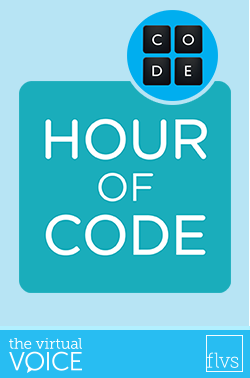 Mrs. Ross looks forward to Computer Science Education Week every year. In the past, she’s worked with students both online and face to face. She loves watching mental light bulbs go off all around the room as, one by one, students who thought they would never learn to code begin solving programming puzzles.
Mrs. Ross looks forward to Computer Science Education Week every year. In the past, she’s worked with students both online and face to face. She loves watching mental light bulbs go off all around the room as, one by one, students who thought they would never learn to code begin solving programming puzzles.
“When something works,” she says, “the excitement on their faces, that’s really cool.”
This year, she’ll be helping students with one of her favorite puzzles: a storybook about Santa’s missing socks. It may seem like a simple exercise, but by the end, students discover they’ve just worked through a challenging computer science concept: the binary search.
Mrs. Ross says one of the great benefits of Computer Science Education Week and Hour of Code is that participants “tackle very complicated concepts without even realizing it.” In many ways, this is the key to showing students that programming actually is for anyone. In fact, she says, programming is a heavily creative field. “I’ve watched a lot of students really surprise themselves,” she says. “There isn’t just one type of person who gets into programming.” Continue reading
FLVS Attends GOES-R Satellite Launch
By Florida Virtual School on December 7th, 2016
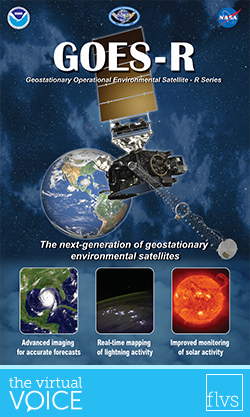 On Saturday, November 19, I had the privilege of watching the GOES-R weather satellite launch from Kennedy Space Center.
On Saturday, November 19, I had the privilege of watching the GOES-R weather satellite launch from Kennedy Space Center.
Now you may be wondering what GOES-R stands for. It’s the Geostationary Operational Environmental Satellite, a satellite system that orbits the earth and sends data back to National Weather Service computers. The R indicates what number or version the GOES satellite is on, so there have already been versions A-R. GOES-S is slated to launch next year and is the twin to GOES-R.
Of course, weather satellites get launched all the time, so why would this one be any more special than the others?
Well, right now we receive images of satellite scans every 30 minutes or so. The GOES-R satellite will provide data at least every five minutes, and in some circumstances every 30 seconds! So not only will it be five times faster than current weather satellites, but it will also gather three times more data and it will have four times better resolution. Continue reading
Being Competitive in Tomorrow’s Workforce
By Tina Leslie on November 30th, 2016
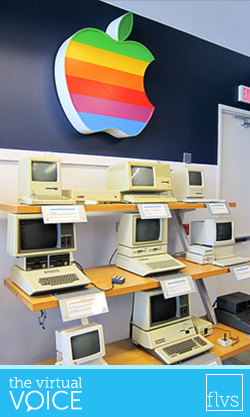 The year was 1989.
The year was 1989.
We saw the birth of the World Wide Web, the fall of the Berlin Wall, the television debut of The Simpsons, and my epic walk onto the stage to receive my high school diploma.
As I proceeded to college, I used the skills that I had learned in high school: doing research using a card catalog, typing reports using an electric typewriter, and doing accounting class projects that required a calculator, a pencil, and a lot of erasers.
If I were to list these skills on my resume today, I would be considered an unqualified candidate.
You may wonder how a college student with outdated skills became an online technology teacher.
It’s simple, really. By updating my skill sets and being able to evolve with new advancements in technology, I honed the skills to which I am referring. Those skills are soft, hard, and transferable. Continue reading
Happy National Distance Learning Week!
By Florida Virtual School on November 9th, 2016
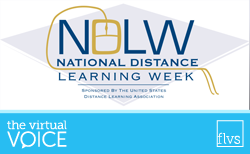 In August of 1981, the first personal computer was invented.
In August of 1981, the first personal computer was invented.
Selling for a whopping $1,565 (today’s price would be more than $7,000), it hardly had any of the high tech specifications that basic computers come with today.
It had an 11 ½ inch monitor (definitely not a touch-screen), a floppy disk drive (most people under the age of 25 have no idea what that even is), and offered a black and white screen. Now, imagine your students and children using this PC for homework. The World Wide Web doesn’t even show up until 1991, so they are very limited in what they can use the computer for.
Now, fast forward to November 2016. Continue reading
To Bennu and Back!
By Florida Virtual School on September 29th, 2016
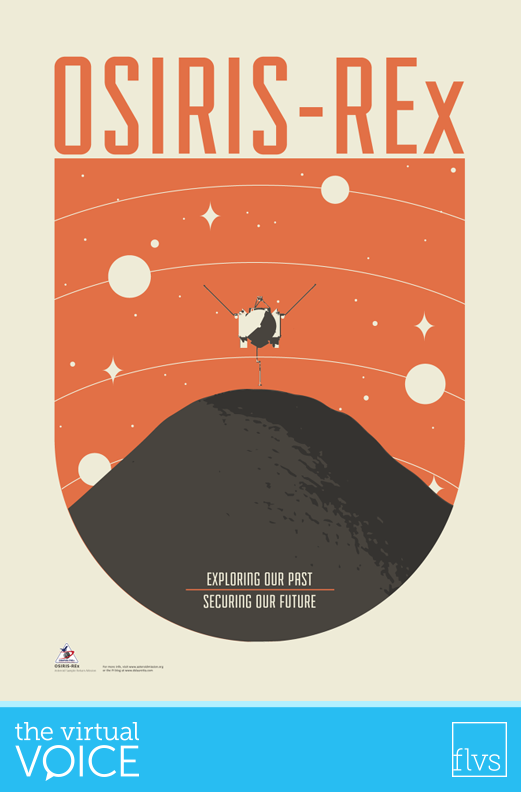 Hello FLVS peeps!
Hello FLVS peeps!
I had the distinct honor of representing FLVS at the OSIRIS REx rocket launch a few weeks ago.
Now if you’re wondering what exactly that means, OSIRIS REx stands for NASA’s Origins, Spectral Interpretation, Resource Identification, Security-Regolith Explorer. That’s a mouthful, right?
In a nutshell, NASA is sending a spacecraft to an asteroid named Bennu. Once it reaches Bennu (after a trip lasting two years), the spacecraft will orbit the asteroid for about a year, find the perfect place to collect about 80 grams of the rock, and head back home, arriving back to Earth in 2023.
It won’t actually land on the asteroid, but instead hover over it – and with the help of Canada and their amazing knowledge of spacecraft arms – will grab a small sample. (To put this in perspective, 80 grams is about the equivalent of 80 Skittle candies.)
So why are we going to Bennu? Continue reading
Let Your Summer Sizzle with STEM
By Guest Blogger on June 30th, 2016
 The countdown is over and summer is now in full swing!
The countdown is over and summer is now in full swing!
Can you hear the rejoicing cries of school-age children saying “no more alarm clocks,” “no teachers,” and “woohoo, no homework!”
Ask students what they want to do as they’re just beginning to submerge themselves in summer-break mode and more than likely you’ll get answers like: relax, watch TV, see movies, go to the beach, and chill with friends. Continue reading
Would you look at that?
By Guest Blogger on June 27th, 2016
 I’ve recently realized just how addicted I am to my phone.
I’ve recently realized just how addicted I am to my phone.
My 2-year-old daughter is the one who helped me see things a bit clearer. Imagine that? See, my 2 year old pays attention to what’s around her. She sees snails idling by on the ground. Snails! And planes that fly in the sky. She sees happy faces in the clouds and she points each and every detail out to me as we play outside.
All the while I sit scrolling on my phone. Scrolling on my phone is relaxing – I will admit it destresses me and allows me the chance to reset myself if I need a few minutes. So I’m not judging phones. I work in the virtual world – trust me, I’m not judging technology. Continue reading
Digital Information Technology
By Guest Blogger on April 15th, 2016
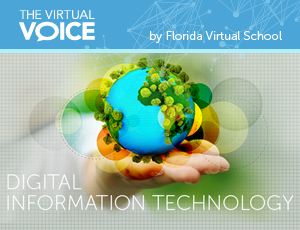 Have you ever thought about what kind of technology skills you will need to be successful?
Have you ever thought about what kind of technology skills you will need to be successful?
Tech skills are essential – not only in school, but in almost any career field you can think of. Sure, you can probably use a computer, surf the web, type up your report, and operate a ton of apps, but do you really have the skills you need for success?
Digital Information Technology will be releasing very soon and provides students with hundreds of fundamental skills in technology, ranging from web page design to using spreadsheets as a tool to display and calculate data. Continue reading
